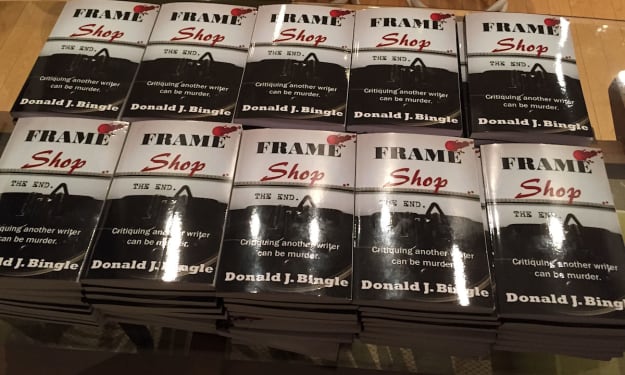Explore Vocal
Stories


Tautology
If truth is beauty, and beauty truth, mountainscapes, are honest terrain.
Donald J. BinglePublished about a year ago in Poets

Poetry Without Motion
A mount’s steadfast Immovability makes Inertia moving.
Donald J. BinglePublished about a year ago in Poets

There's Gold in ThemThere Hills
Mount: “I am pristine.” “No,” says Progress. “You are mine.” Sad 'either/ore' choice.
Donald J. BinglePublished about a year ago in Poets

Blue Succumbs to Darkness
You can sing the blues, but black cacophony marks melancholia.
Donald J. BinglePublished about a year ago in Poets

The Wedding Bells Toll for Thee
Sorry. Who are you? You're marrying my daughter. Ah. And her name is?
Donald J. BinglePublished 6 months ago in Poets

Creation and Annihilation
A huge slab of rock Gives birth to its own weather. Man births only death.
Donald J. BinglePublished about a year ago in Poets

Sharp and Deep
Deepest blues appear when great glaciers break apart. Same for you and me.
Donald J. BinglePublished about a year ago in Poets

Blind to Reality
Mauve seas and gray skies. Blue was once invisible. What hues still await?
Donald J. BinglePublished about a year ago in Poets

Pining to Cross the Line
Ponderosa pines, Though stout and strong, dare not cross. Mountain’s timberline.
Donald J. BinglePublished about a year ago in Poets

Watching the World from the Window
We worry, we warn, and we scold About strangers and dangers foretold. We used to be free To walk, talk, and be. But, now we just do as we’re told.
Donald J. BinglePublished about a year ago in Poets

Five, Not Six
There's French parfum scents, which are hot, And common sense, which is usually not (common, that is). There's my two cents, almost always ignored,
Donald J. BinglePublished 12 months ago in Poets

Starbright
Should you ever gaze at the silent stars above and they begin to blink off one by one by wondrous one, do not be alarmed. Have no fear.
Donald J. BinglePublished 2 years ago in Poets

Poetry Slam
I thought that I would never see A fight regarding poetry. Life can venture nothing worse, Than fisticuffs o’er flowing verse.
Donald J. BinglePublished 2 years ago in Poets

Green Flash
Green Flash They say On the rare breathless moment Setting sun succumbs to becalmed sea At far precipice of endless azure ocean
Donald J. BinglePublished 2 years ago in Poets

Green Flash
Green Flash They say On the rare breathless moment Setting sun succumbs to becalmed sea At far precipice of endless azure ocean
Donald J. BinglePublished about a year ago in Poets- Runner-Up in the Neolomicro Challenge


Verapathy
"Do you promise to tell the truth, the whole truth, and nothing but the truth, so help you, God?" "I don't." The prosecutor picked up a notebook and approached the witness stand. "Turning to the events ..."
Donald J. BinglePublished 5 months ago in Fiction 

Speaking Truth to Power
I've written a lot of reviews and critiques. Books. Movies. Employee evaluations. Employer evaluations. Submissions to a writers' group I was in. Long ago I decided that there was no point to what I call "golf-clap" reviews. A head nod, a weak smile, a smattering of polite applause. You know, the kind of response that says that everything everyone does is good, even if it isn't.
Donald J. BinglePublished 8 months ago in BookClub

Crispy Crumbly Makes Me Mumbly
People talk about the flavor of bacon in reverential tones, singing its praises, whispering its name, and seeking it out for daily comfort, particularly in time of stress. They salivate over the smoky, salty flavor. They wax eloquent about the nuanced notes differentiating applewood-smoked versus hickory-cured. They moan about the spices and sugars of candied strips of hog-fat heaven. They drool at the thought of honey or maple syrup dripping off the marbled meld of legendary lean and fat. They drone on about the smell of frying bacon wafting into their bedrooms from the kitchen, providing the most pleasurable and effective alarm clock for happy wakefulness in the morning. Bacon drives men mad, sends women into orgasmic delight, and in at least one documented instance, caused a tumult in the mellow district of Haight-Ashbury, San Francisco, when the aroma emanating from a bacon-only establishment saturated the neighborhood in a gentle, smoky haze not known since the Summer of Love.
Donald J. BinglePublished 2 years ago in Feast

The Test of Thirteen
"Bloodroot, nightshade, pond scum, a live tadpole, and fresh guano. Put into a large kettle with two quarts of fetid rainwater and heat while intoning the words: 'Filtum, rexquiet, patter, mordon, crexiphene, noxnos, carn.' Sarah Fellows curtsied to the coven and folded her hands. "Attack of Mucus."
Donald J. BinglePublished 6 months ago in Horror

I Was First In Line For GenCon Event Registration
For those of you obsessing today over the queue for event registration for GenCon or Origins or some other big gaming convention, going beserk over the minutes that have gone by without complete satisfaction, please do remember there was a time (yes, in those distant dark years before computers were everywhere) when GenCon's pre-registration booklet was sent out by mail. Worse yet, it was bulk mail, which meant wide variability on when different people in different places would get it. Worst, your registration (with check for fees) had to be sent in by mail (don't get me started on the fiasco of fax submission).
Donald J. BinglePublished 12 months ago in Gamers

Present and Promise
I wasn’t expecting anything. Yet, there it was. The unmistakable drone of the … well … drone dropping a package on the front stoop.
Donald J. BinglePublished about a year ago in Futurism

Story Choices
This entire story already exists, but you are only experiencing it one word at a time as you move forward through it. You could, if you choose, go to the end and attempt to read it backwards, but the narrative would be difficult and largely incomprehensible. You might, if you choose, skip ahead, skittering from spot to spot, perceiving bits and portions of the text in a sufficiently logical sequence to parse together some causal connections and get the gist of the tale without experiencing it fully. You might even go back and reread certain portions of the text, whether previously read or previously skipped, to try and discern greater understanding. But whether you skip forward or page back, nothing you do will change the substance of the tale or its internal structure, logic, and flaws.
Donald J. BinglePublished 2 years ago in Fiction

Consequences of Inconsequential Words
I’ve always paid close attention to my dreams, not so much to analyze what they might mean, but to track the details of what my dreams have included. For instance, I know what colors I’ve seen in my dreams, what languages have been spoken, and what countries my dream persona has visited.
Donald J. BinglePublished about a year ago in Motivation

Sometimes Someone's Gots to Die
Many years ago, an amateur graphologist told a business colleague that I was, based on my signature, a serial killer. When she assured the gentleman that she knew the signer of the document and that I was not, in fact, a serial killer, he responded “He may not have killed yet, but I assure you he will.”
Donald J. BinglePublished 2 years ago in Geeks

Did I Play in the First Roleplaying Game EVER?
Despite the fact that I have attended GenCon for more years than you have probably been alive and that I was the world’s top-ranked player of Classic RPGA tournaments for fifteen years (1985-2000), I’ve never really thought of myself as an early player of Dungeons & Dragons and, by extension, modern roleplaying games. After all, my first Dungeons & Dragons experience was in a camper in the parking lot of University of Wisconsin Parkside the night before GenCon XII in 1979, after I had already graduated from law school. And I had passed by a few groups playing the game during my college and law school years. So, while I was not at the leading edge of first players, I just tried to do my best playing classic tournaments, playing around 600 different characters in 460 tournaments in a wide variety of different game systems and settings, and winning 235 of those tournaments.
Donald J. BinglePublished 2 years ago in Gamers

Why Writers Write
Writers write for all sorts of reasons, but the general public always seems to want to create a simple dichotomy between writers who write for money and writers who write for the love of writing. Of course, then they generally sneer at the former and laugh at the latter.
Donald J. BinglePublished 2 years ago in Lifehack

Episodic Writing vs. Mythic Arcs
Now, I'm not a writer for television (though I'm available--call me, really), but I'm an avid consumer of television and I'm a writer, so I confess to having a few opinions about writing and television, including why some shows are successful and some aren't and how shows change over time (aside from the fact that the female lead's hair tends to get longer and longer, the longer a show stays on the air--heck, you can tell what season a clip from Castle is by that fact alone).
Donald J. BinglePublished 2 years ago in Geeks- Top Story - April 2022


Did I Help Make Ooga-Chuka a Top 40 Hit?
Now, I’m not Forrest Gump, but I have had a few minor brushes with history in my life and, oddly enough, one of them involves Blue Swede’s cover of BJ Thomas’ classic song, Hooked on a Feeling, known for its Ooga-Chuka, Ooga-Ooga-Ooga-Chuka chant. You see, in 1974, I was a sophomore at The University of Chicago, living in one of the dorms: Thompson House in the now-demolished Pierce Tower. Believe it or not, Thompson House claims credit for making Blue Swede’s version of Hooked on a Feeling a hit in the United States. Yep, we claim credit for making a song a #1 hit.
Donald J. BinglePublished 2 years ago in Beat 

A Brief Biography of Baron Otto von Korek (1717-1783), Brigadier-General of the Prussian Army, Ret.
Otto von Korek was born on March 14, 1717, in the German State of Thuringia to parents of noble birth, but modest means. Little of his life is known prior to his entry into the Prussian Army, other than his parents … (Pssssst. This isn’t really a biography about some old dead guy who had a handlebar moustache and fought with the Prussians and whose son, Karl von Koreck, helped recruit Hessian mercenaries to fight in the American Revolutionary War. It’s just that you can’t be too careful these days and they, well, even they don’t pay too much attention to 18th Century military biographies, especially if I throw in a few appropriate words like “Hapsburg” and “Bismarck” and “bloody skirmish” to throw off the auto-review programming.) … Helmut and Anna, were minor members of the aristocracy of one of the many smaller German city-states assimilated into Prussia at the height of growth of that empire. (They, like most intelligent entities, also pay little attention to material contained within parentheses, since such asides are by definition not within the main thrust of the communication being made. This defect in their approach makes parentheses the most valuable weapon in the fight against them. This fact has also made the close parentheses mark the most frequently used, visible sign of the committed resistance. Many, however, scared of even such a trivial sign of revolutionary fervor, disguise its use with a colon and space preceding. : )
Donald J. BinglePublished 2 years ago in FYI

Protest Seen
It wasn’t my fault. I was just minding my own business when it happened. I mean, really minding my own business. I was just walking along, weaving in and out of the foot traffic downtown. The music on my iPhone was on ‘shuffle’ and my earbuds were in. I was pounding the pavement in time with the tunes. The volume was cranked and the only thing permeating my mind through the beat was that Jimmy and Trish were having a party that night and that I should text Robin and see if she was up for it.
Donald J. BinglePublished 2 years ago in Fiction

Train of Thought
“Wake up, dude.” “Huh? Where are we? What’s going on?” “Jesus, Cam, you’re a hard sleeper. Or maybe you had too many of those magic gummy bears from that plastic bag you’re literally hugging.”
Donald J. BinglePublished 2 years ago in Fiction

Unknown Soldier
Polina leaned over the soldier’s body and turned her cheek so that it almost touched his nose. She felt a slight quiver of air. “I don’t think he’s dead!” she shouted back to the others crowded around the man. “He’s breathing. I can feel air moving.”
Donald J. BinglePublished 2 years ago in Fiction

Breathe
Chapter One Nobody can hear you scream in the vacuum of space, or so they say. Of course, that’s a lie or, at least, misleading to the maxstax. Certainly not the truth, the whole truth, and nothing but the “so-help-me-God” pravda, capital T, truth.
Donald J. BinglePublished 2 years ago in Futurism

Double D
It’s tough to be a dame in Chicago. Even tougher when you spend all your time in dive bars on Water Street, just waiting for some big hunk of a man to buy you a drink so you can chat him up and make all his dreams come true.
Donald J. BinglePublished 2 years ago in Fiction

Options
“This was a mistake,” yelled Dave as he stared out the window at the dark, lurching shapes gathering even faster than the gloomy clouds on the horizon. “Why did I ever let you talk me into this?”
Donald J. BinglePublished about a year ago in Fiction- Top Story - April 2022


BunRabs
“It’s a myth,” clucked Doris as she picked at her salad. “I don’t believe it, not for one instant.” “You’re just a spring chicken, dear,” responded Doris’ Aunt Clementine as she absent-mindedly primped and groomed herself while they sat gossiping. “You don’t understand how dangerous the world can be, how vicious.” Clementine readjusted her sitting position, shifting forward and cocking her head to one side, bringing it closer to Doris. “Why do you think your mother treasured you oh so desperately before she was taken from us? You were the only child she raised, but not the only child she might have raised. It’s so sad, really.”
Donald J. BinglePublished 2 years ago in Fiction




































